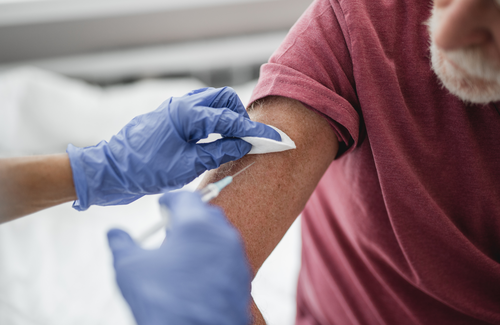
Surveys from diverse settings do not suggest unusual levels of COVID-19 vaccine hesitancy among people living with HIV, the 18th European AIDS Conference (EACS 2021) heard last week. Data were presented from Argentina, Greece, Turkey, the Middle East and the United Kingdom.
People living with HIV are at increased risk of worse COVID-19 outcomes than the general population. Achieving a high level of vaccination among people with HIV is therefore crucial. However, low levels of confidence in novel COVID-19 vaccines is a widespread phenomenon.
The largest of the surveys was of 1486 people living with HIV in Argentina: 84% said they would have the vaccine if recommended by a healthcare provider and 79% if the government mandated it. Safety was a crucial factor for those who were hesitant about vaccination.
A survey of 298 people attending an HIV clinic in Athens, Greece found that 81% were either willing to be vaccinated or had already done so. Among those who were hesitant, the main reasons cited were that the vaccines had not yet been sufficiently tested and a concern about side effects.
In a similar survey of 40 people using HIV services in Istanbul, Turkey, 70% had already been vaccinated, which is higher than the national rate of 59%. As in the Greek study, men and people with higher levels of education were more willing to accept COVID-19 vaccination. Religious beliefs were not associated with vaccine hesitancy.
A total of 541 people living with HIV in Egypt, Tunisia and Saudi Arabia were included in the next survey. Just under two-thirds (65%) would probably accept vaccination or had already done so. Living in a rural area was the only demographic factor associated with vaccine hesitancy.
Over 40% believed that they had a high chance of getting COVID-19 and believed that it could cause serious illness. Over 60% thought that COVID-19 can be prevented by vaccination and that the risks of COVID-19 disease are greater than the risks of vaccination. However, over 50% were worried about vaccine side effects and 40% about a possible interaction with their antiretroviral therapy. Over 30% said they had a low CD4 count and were concerned that the vaccine may not be effective for them, while the same number believed that vaccination was not recommended because of their low CD4 count. Over 30% were also concerned about the cost of vaccination.
The final survey was of young people living with HIV and their families attending a clinic in London. While there were just 22 participants, this was the only survey with a majority of female respondents. Three-quarters of participants had already received at least one vaccine dose. Among those who were hesitant, a lack of research information, side effects and long-term health effects were the main concerns.
All respondents said they wanted more information about COVID-19 vaccination: roughly half wanted to receive it during a one-to-one discussion with a medical professional, half would like to talk to someone who has had the vaccine and a similar number would like to read a leaflet (multiple answers could be chosen).
The impact of medical professionals’ discussions and recommendations was a recurrent theme in these posters. Moreover, as perceived safety appears to be the main driver of vaccine acceptability, educating people living with HIV about the available safety data in this specific population is likely to increase vaccine acceptability.
Ballivian J et al. COVID-19 vaccine acceptability among people living with HIV in Argentina. 18th European AIDS Conference, London, abstract PE4/21, 2021.
View the abstract on the conference website.
Protopapas K et al. Attitude towards COVID-19 vaccination of people living with HIV (PLHIV) in Greece: single center study. 18th European AIDS Conference, London, abstract PE4/12, 2021.
View the abstract on the conference website.
Yagci-Caglayik D et al. COVID-19 vaccine adherence among PLWH in İstanbul, Turkey: a cross-sectional survey. 18th European AIDS Conference, London, abstract PE4/54, 2021.
Cordie A et al. COVID- 19 vaccine acceptance and its associated factors among people living with HIV (PLHIV) in the Middle East and North Africa (MENA) region: a cross- sectional multi-centre study. 18th European AIDS Conference, London, abstract PE4/22, 2021.
View the abstract on the conference website.
Nayagam D et al. Views on SARS COVID-19 vaccine amongst adolescents, young people and parents attending paediatric and young persons HIV services in South East London. 18th European AIDS Conference, London, abstract PE4/52, 2021.

